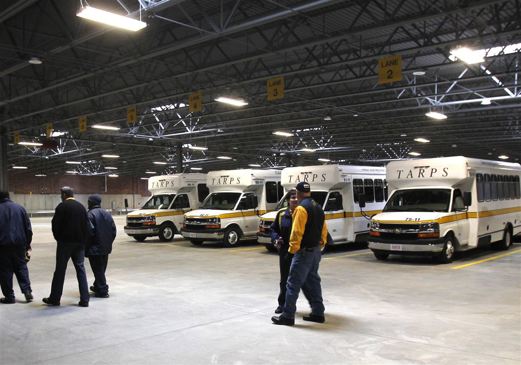Did you know?
The large TARTA vehicles run on biodiesel, a renewable, biodegradable fuel manufactured domestically from vegetable oils, animal fats, or recycled restaurant grease.
TARTA is currently researching more renewable energy sources, like vehicles fueled by hydrogen fuel cells and electricity, to keep the region moving into a greener, more sustainable future.

Efficiency By Design
The TARPS facility at Knapp St includes a geothermal heating and cooling system, solar panels, skylights, reflective roofing and earth sheltering for energy efficiency.

Striking Out Litter in Toledo
Team TARTA has been an enthusiastic participant in the City of Toledo’s Litter League. Along with other organizations hundreds of bags of litter have been removed.
TARTA’s Trash Troop
Among TARTA’s other environmental initiatives is TARTA Trash Troop. Each summer, a team of volunteers from TARTA competes in Keep Toledo/Lucas County Beautiful’s Litter League. In four years of the competition, TARTA has won its class every season, totaling more than 350 bags of litter collected and disposed of.
52.223-22 Public Disclosure of Greenhouse Gas Emissions and Reduction Goals-Representation
GHG Emissions (MTCOeq)
| Upstream | Downstream |
Total |
|
| 2021 | 932 | 6,938 | 7,860 |
| 2022 | 1,043 | 7,472 | 8,515 |
| 2023 | 1,426 | 7,112 | 8,537 |
| 2024 | 1,553 | 10,553 | 12,106 |
Energy Use (mmBTU)
| Upstream | Downstream |
Total |
|
| 2021 | 10,407 | 38,988 | 49,294 |
| 2022 | 11,645 | 42,980 | 54,625 |
| 2023 | 15,920 | 8,795 | 24,716 |
| 2024 | 17,338 | 34,172 | 51,511 |
FTA Transit Greenhouse Gas Emissions Estimator v3.0:
Upstream Emissions - associated with the extraction, production, and transportation of vehicle fuel
Downstream Emissions - tailpipe emissions resulting from the operation of transit vehicles
MCTO2eq - metric tons of CO2 equivalent
mmBTU - metric million British Thermal Unit
GHG emissions and energy use factors for toad-based vehicles, including buses, are from Argonne National Laboratory's Greenhouse Gases, Regulated Emissions, and Energy use in Transportation (GTEER) Model, 2021 release (October 11, 2021)
Empowering people to make connections.







